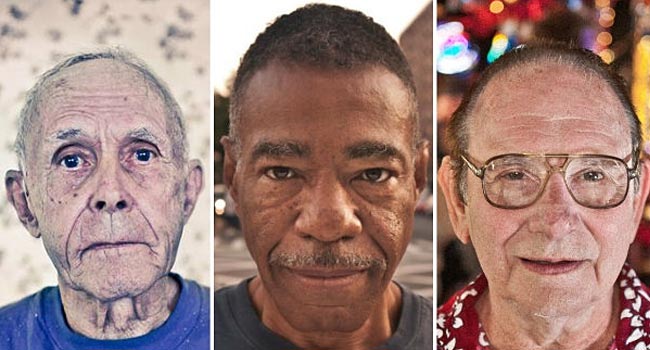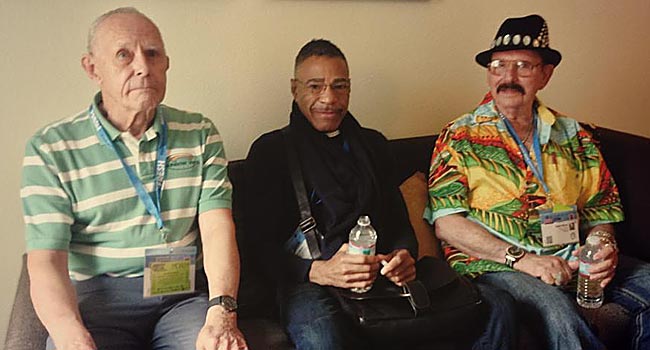Interview: PJ Raval and Dennis Creamer of Before You Know It

Director PJ Raval’s Before You Know It is a beautiful, grounded documentary highlighting a very specific group of Americans—elderly gay men. Seniors are desexualized and largely neglected by society already—when I see seniors in public, the people around them typically act as if they’re invisible—so being an elderly gay man comes with an extra set of challenges.
Dennis Creamer —an avid Star Trek fan and one of the subjects in Before You Know It—is a prime example. He came out when he was 70 after his wife died and became fond of cross-dressing. The film follows him on his path of self-discovery along with two other subjects. Robert is a no-bullshit, sassy bar owner in Texas, and Ty is a gay rights activist from Harlem. It’s fascinating to watch the three subjects react to America’s ever-changing social climate (Ty’s segments were filmed as gay marriage passed in New York).
Raval and Dennis took time with Way Too Indie to talk about the making of the film, the inspiration behind it, what it’s like to explore your sexuality at an advanced age, the importance of colonizing Mars (yup), and more.
WTI: Let’s start off with the most basic of questions, PJ—how did this project come about?
PJ Raval: I made a film called Trinidad, and while touring with it I was at a reception at the Hudson Valley LGBT community center where about 85% of the crowd was gay seniors. I think it was the first time that I was in an environment where I recognized such a large number of members of that community. The wheels started turning. Why hadn’t I seen this before, and why hadn’t I heard about this community? I went around [at the reception] thanking people for throwing it and heard all these amazing stories.
Around the same time, I was volunteering for an organization to teach queer youth filmmaking. There was a person in there who was 14, and I started thinking about if this [kid] was even aware of the [senior gay community]—the other end of the spectrum and some of the stories these seniors have. I started thinking particularly about this senior population and how they had seen such a large amount of change in such a short amount of time. [I thought about] them being born pre-civil-rights [and living] all the way up to things like gay marriage and seeing gay characters on television. That’s such a large change that they’ve seen in their lifetime.
I had also started having conversations with my mom. She was thinking about retiring, what goes into that, the emotional and financial changes that occur, and I started thinking about where things are going to be when I’m 74. Putting all of [those events] together, I began to think about making this documentary and how it would be an opportunity to explore the aging process and other things people don’t want to think about through the stories of these people I follow through the film.
WTI: Why don’t people want to think about those things?
PJR: It’s interesting. Early on, when I interviewed Dennis, he had a quote—“I think young people don’t want to look at us because it makes them think of how they’ll grow to be old too.” We live in a very youth-obsessed culture, and I think part of that is not acknowledging the aging process. There’s a lot of power to youth, but I think there’s a lot of power to aging [as well]. There’s a lot to learn from the senior population.
WTI: Dennis, how did you become involved in the film?
Dennis Creamer: I had moved out to Rainbow Vista (a retirement home for gay seniors), but still spent a lot of time at my [Florida home]. PJ came out to film, and I gradually became a part of the program. I came out and started cross-dressing fairly late in life, after my wife passed away. It was a gradual process. Little by little, I became more out-of-the-closet.

WTI: What did you think of the film?
DC: My self-image is of a much younger person, so when I’m confronted with reality, it’s…dramatic (laughs).
WTI: It’s beautiful to watch you discover new things about yourself so late in life.
DC: Thank you. It’s the filmmakers who make me seem somewhat sympathetic (laughs). It was their artistry that did that.
WTI: PJ, what drew you to the other two subjects in the film?
PJR: [The filming process] actually unfolded the same way it does in the film. I discovered SAGE while doing internet research. It’s a New York-based organization that serves LGBT elders. I discovered that they had a Harlem division, and I came into contact with Ty. The funny thing is that he was actually supposed to be the person to connect me to potential “characters” to follow. After meeting him, speaking to him, and following him around for half a day, I realized that he was the character I was looking for. He had such an interesting background.
I was filming [Ty] and Dennis simultaneously for about another year. I decided at the start that I wanted to do three characters and kind of round it out that way. I [also] knew that I wanted to look at communities that were outside of these known gay communities like San Francisco, a place that people wouldn’t think of first in terms of a gay community.
WTI: That was your aim for the third character.
PJR: Yeah, that was my aim for sure. I wanted to look at a different culture entirely. I had urban culture in Harlem, and Dennis, who was living between Miami and Portland. I’d heard a lot about Galveston [Texas] and the gay community down there, so I went down there on a hunch. Within 24 hours I met Robert, who became the third character.
WTI: Let’s go back to Ty. His portion was filmed during the passing of gay marriage in New York. This is a huge deal, but your film isn’t about gay marriage—it’s about Ty, Dennis, and Robert. Talk about the focus on your subjects.
PJR: I like making films that are intimate character portraits. I’m not interested in putting the issues at the forefront. I think it’s more interesting to observe someone’s life and see the issues that they face on and daily basis. I like to introduce the issues that way. I was very intrigued by Ty because he very much has this attitude of “I never thought I would see these things in my lifetime. I never thought a large group of my community would die off during the AIDS crisis. I never thought I would see gay marriage getting legalized, and here I am now wrestling with the idea of getting married myself.” Ty is a public figure and an advocate, so it was very interesting to see him out there pushing for visibility and rights and then, at the end of the day, go home and wrestle with these issues personally. Each of the characters represents a different stage in life, and Ty represents very much that idea of partnership.

WTI: Dennis, what did you think of Ty and Robert?
DC: I thought they were very interesting people. I’m facebook friends with some of the people from the film. It was interesting seeing some of the struggles that Robert had, and also Ty with the marriage question. For myself, I really don’t think marriage is an option since I’m pushing 80.
WTI: You’ve done so much in the past 10 years, discovered so much.
DC: I’ve seen huge changes in my lifetime, not only in the gay/straight relationships, but also in the country.
WTI: What does Rainbow Vista mean to you?
DC: I lived in Florida, and I’d go a week without speaking to anyone. The chance to go to Rainbow Vista and interact with other people my age and of the same inclination is wonderful. It’s like being liberated. I’ve seen a lot of changes at Rainbow Vista also. All in all, it’s wonderful. We help one another out.
WTI: Community is a big theme in the movie.
PJR: Absolutely. It takes a village to raise a child, but I think it takes a village to let someone age properly also. Community is such a big aspect of that. At both ends of the spectrum, youth and aging, you’re in very vulnerable positions. It requires a good support system. For Dennis, it’s Rainbow Vista. For Ty, it’s SAGE. One of the original gay communities is the bar culture. So much of the gay community started as bar culture, so I wanted to show that it’s still a very vibrant and needed community, specifically in Galveston.
WTI: What has the production of this film meant to you personally?
PJR: It’s been amazing. Not only have I met some really amazing people, but I’ve experienced things in my own lifetime. I never thought I would be in New York when gay marriage passed. I never thought I’d end up marching in a gay pride parade in Portland. It’s been a great way to explore what I think about the aging process and things that I want to make sure are in place for myself [when I become elderly]. Prior to making this film, I never thought about that.
WTI: Why aren’t you in the film?
PJR: I don’t know, maybe I don’t think I’m that interesting! (laughs)
WTI: It was a choice, right? You could have made that film, but you wanted to make this film about the subjects.
PJR: Yeah, I very much wanted it to be about the subjects.

WTI: Dennis, why do you love Star Trek so much?
DC: I’ve seen all the Star Trek movies. If I see them again, I’ll know what’s happening. I’m a space fanatic. I belong to many organizations—the NASA Space Society, The Planetary Society—and I go to conventions. I think it’s very important. I think humans need to colonize mars and other planets. Finding extra solar planets is…hundreds of solar planets have been found. Eventually, we’ll find another earth out there!
WTI: What’s the most exciting thing you’ve seen in terms of space travel?
DC: The landing on the moon. That was something else, the high point of humanity’s existence, I think. Since then we’ve gone backwards.
WTI: How so?
DC: The space shuttle, what I call the “orbiting space hotel” is meaningless. I hope NASA’s getting back on the right track. Mars is the goal, another habitable world. People say we need technology to live there, but the same can be said for Minnesota in the winter! (laughs)
WTI: PJ, how does it feel to give a voice to a community that hasn’t had one in cinema?
PJR: One of the things I discovered while making Before You Know It is that a lot of the concerns that seniors have are concerns we all have. The discovery process doesn’t change. I’d like to think that the film is a celebration of life. There’s still a lot to do in your lifetime, and you should reflect back on the highlights as well. Robert created this really wonderful community [that will exist beyond him]. There’s a certain aspect of legacy in Robert’s storyline.
WTI: An elderly family member once told me “I’m 70, but in my mind I’m still 25.” Do you feel like that, Dennis?
DC: Yeah. At my age, my self-image is that of a much younger person. When I look in the mirror, I say “Someone’s made a terrible mistake! That can’t be me!” (laughs). When I saw my image in the film, I thought “Gee, is that really me?”
WTI: The film moved me because I always had a fear that I would stop growing as a person when I reached an advanced age. Seeing Dennis discover so many new things about himself late in life is inspirational.
PJR: When I was doing research for the film, I came across a lot of statistics. There’s an estimated 4.5 million LGBT Americans over the age of 55. I thought, “Well, that could be argued, because it’s only counting people who are out, comfortable telling another person.” LGBT seniors are twice as likely to live alone. After a while, these numbers are just abstract, and you want to be able to put a face to them, hear some actual stories. I wanted the audience to experience these issues by witnessing someone else deal with them. Maybe it will get them to think about it in their own life. Even though I’m looking at a very specific community, their stories are universal—everybody ages. Everyone faces these challenges. I wanted to reach out to everyone.
I think sometimes there’s a pressure to be very general [when making a film], to create something that isn’t too specific because someone won’t be able to relate to it. I think the more specific you get, the more intimate—the more real and emotional [the film] becomes. By looking at these three stories, you get a sense that you know these people.
WTI: Let me ask both of you—what is the most valuable thing you’ve taken from the experience of making Before You Know It?
PJR: The best thing for me was sharing the film with the people who are in the film. I had been working in it for so long, so it was a great experience to finally screen the film with them there, for them to see each others’ stories, and to just celebrate.
DC: I feel honored to be in the film. It’ll live on after I’m gone. One of the people in the film has passed away at the age of 94. Hopefully, people will see it and say “They lived.”
I saw Before You Know It at the San Francisco International Film Festival, and it will be the opening night film at Denver’s Cinema Q.
